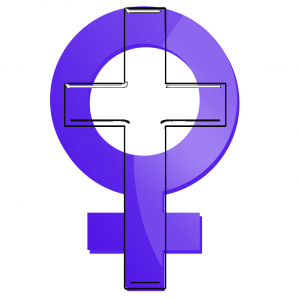A Cisgender White Male Christian Learns About Feminism
// August 11th, 2015 // Articles
I received a reply one day on Facebook where I had posted a comment in a discussion: “Well, you’re a cisgender white male, you wouldn’t understand!” Actually, I didn’t understand; I had no idea what a “cisgender” was. So I looked it up. Basically it means that I identify mentally and emotionally with the gender of my body, in contrast to those who feel personally that they do not, e.g. a male personality in a female body.
As a Christian I feel that it is my duty to love everyone, as I have made clear in the past. In some ways we can love unconditionally without prior thought, but in other ways I believe understanding leads to greater love. In this case, I felt like I may be perceived as the enemy for things I was born with (male, white, cis) and what I chose to believe about God. So, I asked my friends that consider themselves feminists this question:
Most of the things about myself I can’t really change; I was born like this. I did want to ask then, what feminists would like me to do personally. I know I can’t understand what it’s like to be other than how I am, but is there something I can do? Is there something you expect from people like me? What can I do to not be part of the problem? Is there room in your worldview for me? Where do I fit in? I don’t want to be the enemy just because of who I am.
Two of my friends, Rachel and Sonni, took me up on the offer. Their responses were well reasoned and kind. Here’s what I learned.
Feminism is a Movement
“There is no Feminist Pope who hands down dicta to declare what is and is not feminist, and who is and is not a feminist. It’s a collection of academics, artists and activists who all share the common belief that the world is unfair to women and this is a problem to be fixed,” Rachel explains. The reality is that there are really different facets (and even different waves) of feminism, but it all revolves around the idea that society generally treats women unfairly. That means that any feminist you meet might have different ideas on how to go about being a feminist and enacting social change.
This is strikingly similar to being a Christian; different ideas on worship and conduct but a central focus on Christ. We all know how many denominations there are and even the bitter fights between sects of Christians; this was something I could deeply understand. There’s no one Christian leader that speaks for us all (anymore, at least), and we certainly don’t all agree on how to “do” Christianity. In the same vein, I realize that the media loves to stereotype Christians and quote the worst among us — and that tendency certainly could apply to feminism as well. The idea of a topless woman activist on the street screaming at passing men bears a similarity to street preachers on the corner with a megaphone condemning passersby; neither one of these individuals accurately represents the entire group, but they are some of the most visible.
The important thing to come away with is that feminism represents a diverse group of individuals, and each individual has his/her own take on it. Even though it’s possible some might see a white cis male as the enemy, that is not the prevailing or even primary idea of feminism. As Sonni said, “You don’t start out as the enemy; that’s like assuming that all feminists hate men.”
I Have a Built-in Privilege
This is a hard one for many of us white males to hear. A lot of people have what they consider difficult lives — having been passed over for a promotion, legal troubles, health issues — and some quite terrible struggles. Certainly it would be easy for a rich, successful white man to see privilege, but a poor white man beset by problems feels anything but “privileged.” That’s a matter of perspective. I see now that there is sort of an individual privilege that does go with being a male, and a majority race. I have mostly ignored it in the past because I believed in my heart that I was entitled to it. (Now this is just my personal journey, perhaps it applies to you, perhaps not.) I felt that because so many other bad things had happened to me I should have some privilege here and there to balance it out. That’s not what fair really means, though. A minority woman could have had most or all of the same exact hard times as I have but she would not have gotten the “balance” of privilege to make it better. That’s what is not fair. Certainly, there are some situations where women have an advantage over men; but in the overall grand scheme, men have more advantages in our social constructs. Hardly anyone will deny that women still do not receive equal pay, even after adjusting for job selection.
Men Don’t Realize They Are Part of the Problem
“And it’s really frustrating to see that so many otherwise good men have such a big blind spot when it comes to listening to women, believing women’s stories and empathizing with uniquely female experiences. And so when feminists speak of the dreaded White Hetero Cisman, that’s who they’re thinking of — a man who’s so invested in thinking of himself as a good person that he’s utterly resistant to any challenge to his behavior or outlook. Especially when it comes from a woman.”
I can’t say it better than Rachel does here. It seems that many men think that if they are not rapists or abusers they are “doing their part” and should be left alone. Are we really that ignorant of the subtle male dominated influences and the blatant objectification of women in our society? Can’t we see from our media, entertainment, and society that there is a problem that is deeper than physical abuse?
As Christians, I appeal to us through the Bible. Though we do good things, we are told not to think of ourselves as “good.” (I know, my reformed roots are showing. See Romans 3:10-12 Luke 18:19) Fooling ourselves into thinking we are good people is a trap that takes us away from our need for God’s goodness in our lives — we are “good” the more we are like him, not just because we “don’t do bad things.” Being a Christian is not a checklist of things not to do. Instead it is about a relationship with God that allows us to love others, love God, and love ourselves, while living in the knowledge that God’s salvation is a gift to us that we did not earn. Simply put: thinking we are “good” leads to complacency, when the Bible clearly teaches that our sanctification is a continuous process that is not complete until the next life. (1 Peter 1:7, Phillipians 1:6)
Let us not live in ignorance. As Jesus said, Why do you look at the speck of sawdust in your brother’s eye and pay no attention to the plank in your own eye? How can you say to your brother, ‘Let me take the speck out of your eye,’ when all the time there is a plank in your own eye? You hypocrite, first take the plank out of your own eye, and then you will see clearly to remove the speck from your brother’s eye. (Matt 7)
We will always have blind spots — removing one is a step forward, but just removing one does not mean there aren’t more. We continue to learn and grow until we leave this earth.
How To Help
We can stop being part of the problem; some of the ways are simple, and some are more demanding.
- When “white men” or other groups are criticized, don’t take it personally, it’s not you in particular.
- Listen to what women have to say
- Pay attention to women in media: writers, filmmakers, etc.
- Use your privilege for good, support women when you have the opportunity
- Don’t “pile on” in groups of men that are degrading women
I understand that Christianity has done many evil things throughout history, and that a criticism of that is not against me personally. I know that I didn’t do that thing, but I also recognize that as part of that group I can take some responsibility. In the same way, “white men” have done some bad things.
Listening to women includes recognizing their emotion as valid. Women have quite a few rational reasons to be angry and writing that anger off as “women being overly emotional” is an insult. We also can give recognition to women in male-dominated fields such as science, filmmaking, writing, etc. If a woman is being discriminated against and we have the power to do something about it, we should. If you’re a man out “with the boys” don’t engage in woman degrading talk.
Are Christianity and Feminism Incompatible?
One might as well ask if Protestants and Catholics are compatible. It depends on the person and individual interpretation — but I think we can all agree that whatever we believe it’s in our best interests not to be hostile, violent or evil to each other. As far as the Bible goes, in my opinion, Christianity and the concept of women’s equality are very compatible. In fact there is a Christian organization that puts forward this mission, Christians for Biblical Equity. I’d also like to point you toward this article from Relevant magazine, Why You Should Be a Christian Feminist.
We are taught that all are equal in God’s eyes. (Gal 3:28.) Christianity has taught (to varying degrees) that men and women have different roles to perform. This is not incompatible as long as we as believers respect that differences in roles or appearance or anything else does not equate in any way to the worth of an individual. Equal rights and equal pay for women is right and fair and I believe very biblical. Using Christianity and God’s word to abuse women, put down women, or control them because we don’t like their opinion is wrong. God will certainly judge that behavior. We should also keep in mind that people outside of Christianity might not agree on our traditional delegation of roles, and that is their free right to do so.
Christians should realize that we believers span many cultures, and that other societies have completely different perspectives outside of our faith. Though we might disagree with others, there is never any excuse for superiority, self righteousness, smugness, or denigration of those other human beings who have voluntarily chosen a different life path than us. A path God himself allows them the choice to take.
Regardless of culture, genetics, or belief — I think everyone can get behind the idea that women should be treated as people that are just as valuable and important as men.


